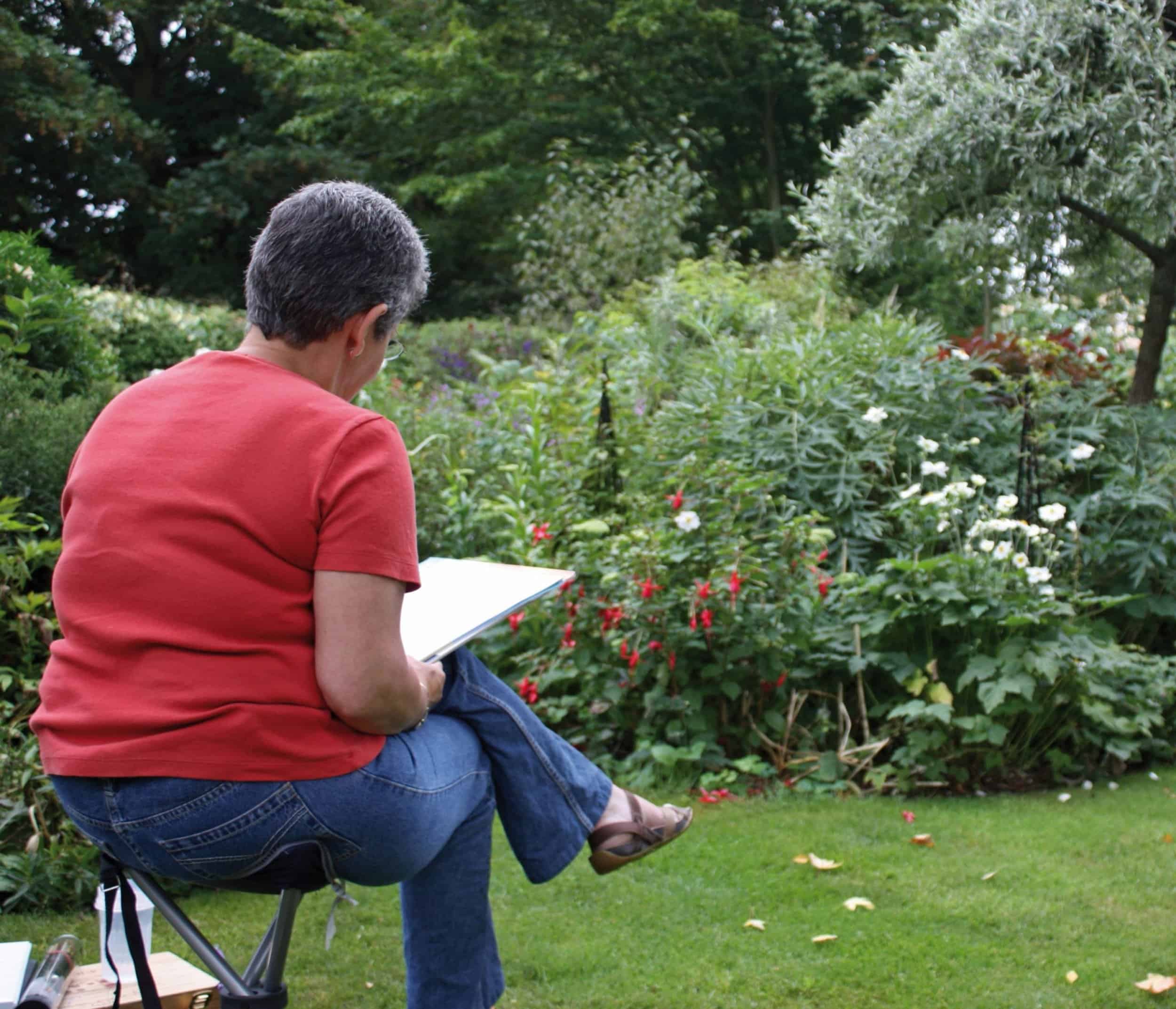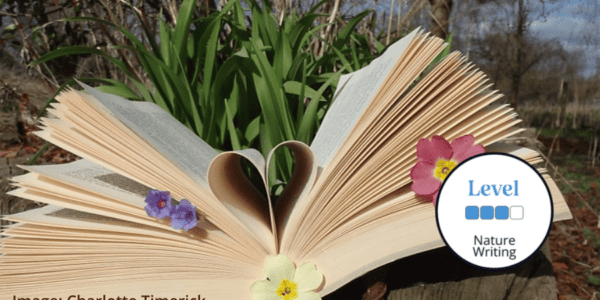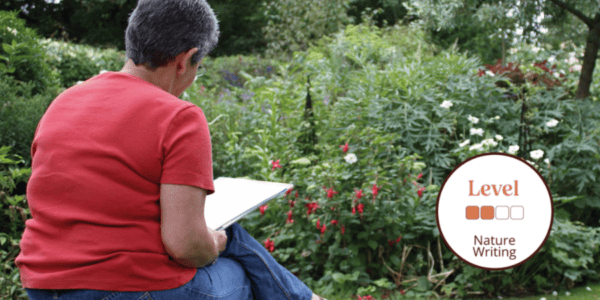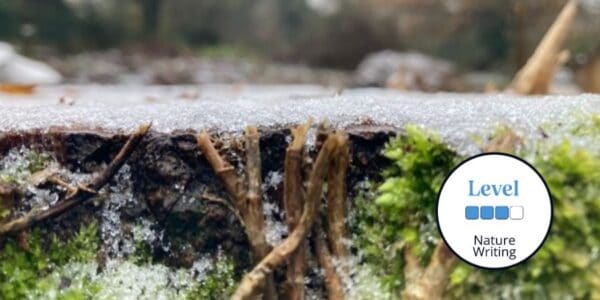This intermediate online course will introduce you to the roots of nature writing. Creative writers are taken through a series of exciting workshops where they take inspiration from the analysis of a variety of sources and hone their craft.
What is covered in this course?
- The Roots of Nature Writing
- Philosophical Nature Writing
- Political/Polemical Nature Writing
- Literary Nature Writing



Read More
Become a better writer by becoming a better reader as you take inspiration from the analysis of literary pieces throughout history on this creative writing in nature course.
During this course, you will begin to take inspiration from nature, Japanese literature, nature journals and other famous pieces of literature. You will then create your own pieces and share them with other learners whilst offering support and feedback for each other. This course is brimming with activities and is equally suitable for budding naturalists and people who enjoy writing and reading.
This is a 4-week online course covering 4 topics. Each topic is begun with an interactive Zoom workshop after which you will complete a variety of self-led online resources and activities using the skills and techniques covered. Time commitment is approximately 4 -5 hours a week and an E-certificate is provided upon completion.
By the end of the course, you will be able to:
- Consider the purpose of nature writing and analyse the effect of concision and language
- Explore a range of different ideas and philosophical beliefs regarding the role of nature and our connection with it
- Evaluate the importance of, and the relationship between, structure, imagery and mood
- Investigate the precision with which a piece of literary writing is constructed
Share this knowledge with friends, family, and fellow volunteers.
Who Should Attend? – Budding writers, Nature enthusiasts, Students, Rangers, Early career ecologists.
Knowledge Level – Intermediate.
Participants should be used to writing regularly and are familiar with writing techniques such as similes, metaphors and imagery and how to use punctuation appropriately.
Level descriptors can be found on the following webpage: Framework and Course Level Descriptors
Prior Knowledge – No existing knowledge or experience is needed for this course. Just a willingness to contribute and learn.
Understand how our online courses are delivered
Live Webinar Information
There are 4 webinars for this course, taking place at the end of each week. Please see the date listing below for the day and time.
Please note – webinars will be recorded and uploaded to the virtual learning platform for learners unable to attend.
About the Tutor
Woody River
Woody River is the Director of Secret Landscapes, which offers guided walks on the themes of botany, foraging and literary heritage. With a BA (Hons) and MA in Literature and Creative Writing, Woody is also a qualified teacher who designs and teaches literature and botany courses for adults, as well as providing private tuition for international secondary school students. She has a particular interest in wildflowers and ferns, and loves observing different species of primate in their natural habitats.
Example Timetable
Week 1: The Roots of Nature Writing
Self-study material available from the start date.
Week 1 Live Webinar at the beginning of week 1
Week 2: Philosophical Nature Writing
Self-study material available at the start of Week 2
Week 2 Live Webinar: at the beginning of week 2
Week 3: Political/Polemical Nature Writing
Self-study material available at the start of Week 3
Week 3 Live webinar at the beginning of week 3
Week 4: Literary Nature Writing
Self-study material available at the start of Week 4
Week 4 Live webinar at the beginning of week 4
The final deadline to complete any outstanding assignments and self-study components is 3 weeks after the final webinar.
Time commitment: This course will require approximately 2-3 hours of your time each week. This includes covering course materials on our Moodle learning platform and the Zoom session.
What's Included
What’s Included
The course has been carefully created to help you continue to build and develop your knowledge as the course progresses. With content crafted to the online Moodle Platform and bespoke to the Field Studies Council.
The course includes:
- 45-minute interactive weekly Zoom workshops to connect with the tutor and other participants
- Expert tuition for which the Field Studies Council is renowned
- Activities to work on independently in advance of each Zoom workshop
- Tailored course completion certificate
Once registered, you will follow well-illustrated, user-friendly ’books’ to pick up knowledge. Quizzes and skill checks will give you instant feedback on your learning. Forums give students the chance to interact with each other as well as a place to share work.
Reviews
-
★★★★☆
Woody was always on hand to advise us and was very keen for us to discuss our work.
Bursaries and Subsidies
Student Discount
This course is eligible for a student discount. If you are a current student, please use discount code BioStudent20 at checkout for 20% off all Biodiversity courses.
Before You Attend
Accessing Your Course
- Once you sign up you’ll receive an email at least 24 hours in advance of the course opening with details of how to access our easy-to-use platform, Moodle.
- Moodle can be accessed through a browser or an app.
- Webinars are via Zoom so you won’t need any new software to attend
Recommended Devices
It is recommended that you access your course through a PC or laptop. Please be aware that there will be reduced functionality if you decide to access the course through a tablet or smartphone. The Field Studies Council is unable to email content directly to you.
Other Requirements
Participants will need to source the following texts before the start of the course:
- Deakin, Roger, (2007), Wildwood: A Journey Through Trees, London: Penguin Books.
- Griffiths, Jay, (2021), Why Rebel, London: Penguin Books.
Opportunities to attend this course
-

Thu 04, July 2024 - Thu 22, August 2024
The webinars will take place on Thursdays 7.30 pm - 8.15 pm.
- Week 1: 11 July 2024
- Week 2: 18 July 2024
- Week 3: 25 July 2024
- Week 4: 1 August 2024
Progress Your Learning
This is a training course from the Field Studies Council, delivered by expert tutors with an approachable learning style. After attending this course, you may like to progress your learning with further relevant courses or branch out into other areas of natural history. The Field Studies Council offers both online and in person courses, so you can choose the learning style that suits you best.
The course gives you the opportunity to immerse yourself in a new subject and acquire novel skills. Our online portal gives you time to study at your own pace and fit the lessons around your own schedule.
If you have any questions about our online courses please check our Frequently Asked Questions or email [email protected].
Group Bookings Made Easy
If you have a group of 10 or more individuals wanting to complete one of our courses, our team are available to discuss your options – from discounts to private team courses. Find out more!
You can rest assured that the absolute best content from an expert in environmental education will be at your fingertips. In choosing a Field Studies Council course, you will be joining thousands of people who learn with us each year.




